Rich results are rocking the SERPs

Rich search results are everywhere. Years ago, search engines presented search results without much adornment. Today, the search results look very different, especially on mobile. We see extra information beneath the links, plus a couple of big blocks of rich — often visual or action-oriented — content, depending on what you look for. In this article, we’ll briefly go over some of the different rich results and what they mean for SEO.
What are rich results?
Rich results are a special brand of search results — made to stand out and help users achieve their tasks or get their answer more quickly. These results range from recipe carousels to complete interfaces from things as jobs and flights. Search engines are expanding the number of subjects that trigger a rich result. Getting featured in a rich result is rewarding since it is located at the so-called position zero.
A closer look at rich results
First, let’s look at what regular search results a.k.a snippets are. A snippet is an individual search result with black lines of text beneath the title. Here you’ll read a piece of text introducing the search result.

Rich search results are the results that stand out due to formatting or on-screen location. Rich results is a catch-all term search engines use to describe parts of the search results that have a highlighted presentation.
There are a lot of them, and new ones keep popping up. Search engines are looking for the best and fastest possible way to get an answer to a user. For instance, if you search for a product, you get product-oriented rich results like reviews and availability. While if you search for a particular recent movie, you see where it’s playing and it even lets you book tickets right away.
Here’s an example of a rich result for a specific product, namely a Fender American Professional Precision Bass.

But that’s not all that’s changed. The entire search result page looks a lot richer than years ago. For example, this is what a desktop US search results page for a specific product looks like. It’s got a lot of stuff going on:
- Ads by several shops to order it online
- A sponsored shopping panel to order it online
- Rich snippets for product listings in the organic search part
- Questions people ask about this product
- Video overviews and reviews
- Editorial reviews
- User reviews
- Images of this product
- Related searches
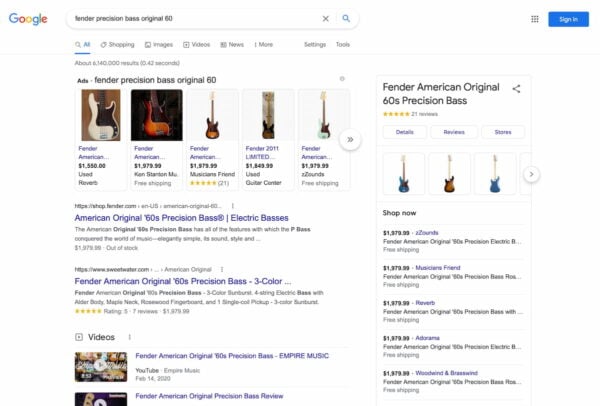
Omnipresent on mobile
There are a couple of other enhancements to the search results pages. On mobile, for instance, you’ll find an incredible amount of rich results. These results provide a lot more actionable information, directly from the search results page. Rich results are available for lots of topics, from movies — you can see an example of that below — and recipes, to local restaurants and online courses. You can check the results of your rich results in Google Search Console.
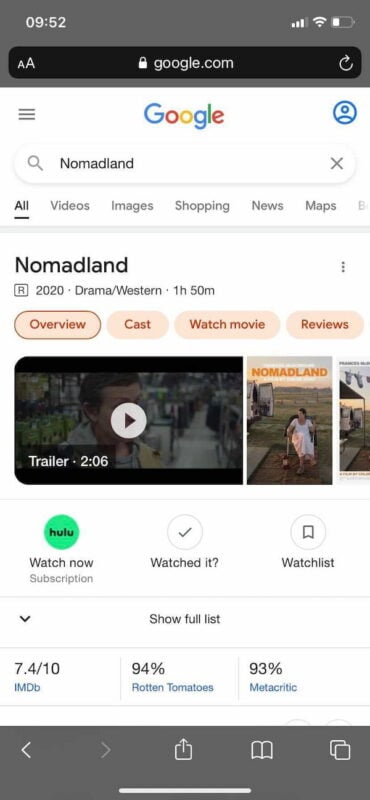
Featured snippets and answer boxes
Now there are also featured snippets and answer boxes — the latter will show when Google itself knows the answer to a question itself, often directly coming from the knowledge graph. These boxes will show at the top of the page to answer a query right away, in the search results. Last but not least, there’s the knowledge graph card; this is the big block of information on the right-hand side.

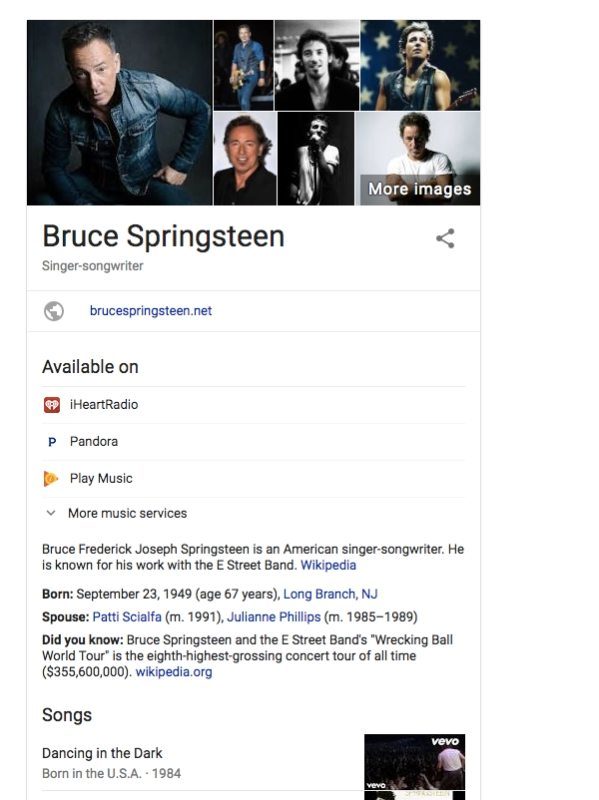
Read more: Rich results, structured data and Schema: a visual guide to help you understand »
Building blocks for rich results
To increase the chance of getting rich results, you need to add structured data to your site. The structured data is in a vocabulary called Schema.org and can be added to your page in different ways. First, you can use the classic formats: Microdata and RDFa. However, Google favors JSON-LD. This is a JavaScript format to easily markup structured data in a way that’s readable for both humans and machines. On Schema.org you’ll find a neat getting started guide.
Our Yoast SEO plugin uses JSON-LD to automatically add a lot of structured data information about your site. Plus, it marks up how-to articles and FAQs among other things via structured data content blocks. We stitch everything together in a neat graph. A graph is an interconnected overview of your site and how all its entities — company, authors, etc. — are connected to that. Read our Schema documentation to get up to speed.
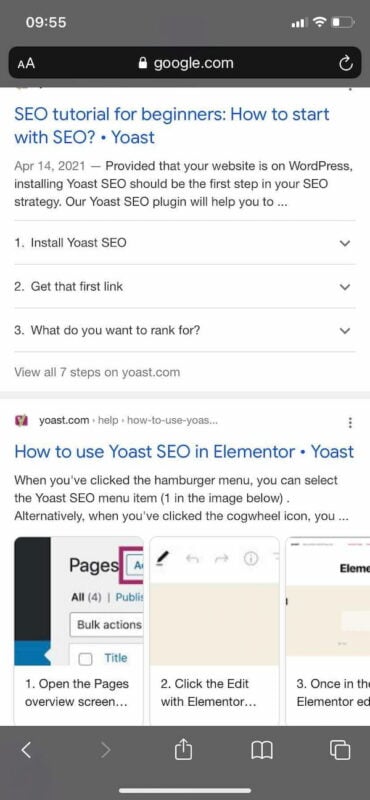
What do rich results do?
In addition to telling the search engine what all the pieces of your site are, the main goal of rich results is to inform the searcher. A rich result might entice the searcher to click on the link. Users can now judge directly from the search results if a certain result is the one they are looking for.
Let’s say you have a business delivering flowers. You’ve done a lot of work to rank well in the search engines for the term [flower delivery to the Netherlands]. You rank pretty well, but your competitor has rich snippets, and you don’t. He shows his reviews directly in the search results and his flower shop rates 4,4 out of 5 stars. His stars just naturally catch your eye. With his high rating, he might attract more clicks from searchers, just because he has a more ‘trustworthy’ profile. You know what you have to do.

Do rich results have benefits for SEO?
Adding structured data does not directly result in better rankings. Sometimes, you might even get a rich result without having any structured data on your site. It does, however, make you more visible in the search results. Search engines understand your pages better and can, therefore, present your result a lot better. This, in turn, might lead to more focused traffic, extra sales, links and in the end; better results from your site.
If your listings get rich results, searchers will notice you more because you stand out from the crowd. This can lead to a higher click-through rate (CTR). In addition to that, if your snippets are really good, your bounce rate may potentially go down. The reason for this is that searchers can make better judgments directly from the results. If your listing is not up to scratch, searchers might skip you. If it is, they know your listing should promise what it says. All you have to do is deliver the result it promises.
Keep in mind that it’s up to the search engines to determine if your listings get rich results. There are no guarantees you’ll get them.
What types are there?
There are different types of rich results. Here are some prominent examples. You can see some of these in action in Google’s Search Gallery.
Products
Mark up products with Schema.org/Product and you can get rich results in search results. Your product can be enhanced with ratings, pricing, and availability, for example. In this post, we explain how you can enhance your product listings in search engines.
Reviews and ratings
Do customers give your product ratings? Then you could collect them and mark these up as ratings or reviews with Schema.org/Review. This way search engines recognize the product reviews and might show them in the search results. We’ve written a post on reviews and ratings as well. Remember, reviews must be present and visible for visitors of the page. Also, Google recently put the cap on self-serving reviews. This means that, for the organization and localBusiness type, collecting those reviews yourself to get them in the search results is not allowed anymore.
Businesses and organizations
Your local business should present the correct structured data to search engines (Schema.org/LocalBusiness). If you use this data, search engines will pick it up and might highlight your business in the results. If you want to mark up your local business, you should read the article on local business listings. Don’t have the time or knowledge to add all this information yourself? Our Local SEO plugin can do it for you.
Recipes
You can now see recipes directly in the search results. If you are searching for a recipe for cheesecake, you can now find it without leaving the search engine. To activate this on your cooking site, you need to add Schema.org/Recipe data.
Events
Event listings have been around for quite a while, but Google recently revamped and expanded the listings. If correctly implemented clubs, venues or other social and cultural entities can show multiple upcoming events directly in search results. Check out Schema.org/Event.
Jobs
Marking up your jobs with jobPosting Schema might lead to inclusion in Google Jobs interface. This will highlight your jobs in a section of Google Jobs. Find out more on Schema.org/JobPosting.
Courses
By adding Schema.org/Course data you can highlight your course in the search results. Among other things, you can show a description, tutor, price and the institute that facilitates the course. You can find a couple of example sites, including markup at W3.org.
FAQ & How-to
There’s a lot going on at the moment, with Google adopting new rich result formats. Some recent additions to the roster are FAQs and How-tos. You can easily build the content for these pages with our FAQ content block and How-to content block.
How can I add them myself?
It used to be fairly hard to add the data needed for rich results, but times have changed. Yoast SEO has now stepped in to help you add valid structured data by automatically generating the most important data in the background. You can easily set up your structured data settings and make sure they’re correct by doing our Yoast SEO first-time configuration.
Plus, you can determine on a per-page basis what each one is specifically about using the Schema tab. In addition to that, we have built our Schema structured data implementation to be as extensible as possible. If you or your developer has built your own structured data it’s possible to add this to the graph. Our Schema integration documentation has examples of how to do that.
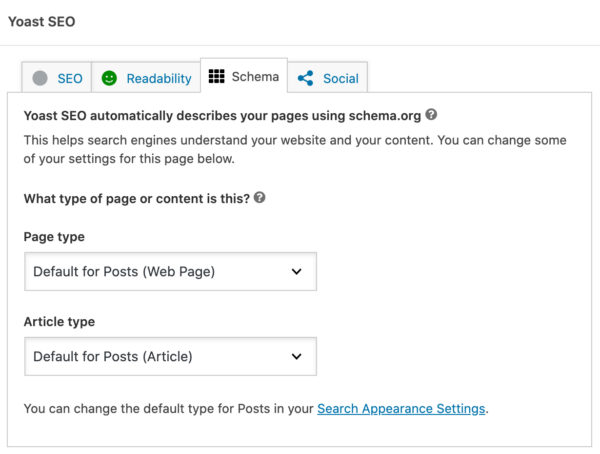
We offer a free Structured data for beginners course and an Understanding structure data course that helps you get to grips with the concepts and technology behind all this. In addition, Google has a Codelab on structured data showing you the ropes.
Don’t forget to test
When you’ve added structured data, we strongly recommend doing some testing. This helps you figure out whether you’ve added the correct structured data and which rich results can be generated. Test your page by entering the URL into Google’s Rich Results Test or the Schema Markup Validator on Schema.org.
Keep reading: How to check the performance of your rich results in Google Search Console »
Conclusion
While adding structured data for rich results doesn’t directly lead to better rankings, it will lead to a better understanding of your site by search engines and visitors alike. As with a lot of SEO related things, you are still in the hands of search engines. They will determine if a site gets rich results or not.
Don’t let this stop you, though. Adding structured data to your site is always a good thing because you are making your site clearer to search engines and thus creating a bigger chance of them presenting your site in the best possible way.
Read on: Structured data with Schema.org: the ultimate guide »


Discussion (6)